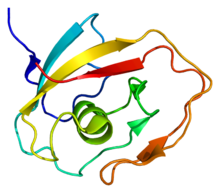In molecular biology, the LCCL domain is a protein domain which has been named after several well-characterised proteins that were found to contain it, namely Limulus clotting factor C, Cochlin (Coch-5b2) and Lgl1 (CRISPLD2). It is an about 100 amino acids domain whose C-terminal part contains a highly conserved histidine in a conserved motif YxxxSxxCxAAVHxGVI. The LCCL module is thought to be an autonomously folding domain that has been used for the construction of various modular proteins through exon-shuffling. It has been found in various metazoan proteins in association with complement B-type domains, C-type lectin domains, von Willebrand type A domains, CUB domains, discoidin lectin domains or CAP domains. It has been proposed that the LCCL domain could be involved in lipopolysaccharide (LPS) binding.[1][2] LCCL exhibits a novel fold.[3]
| LCCL | |||||||||
|---|---|---|---|---|---|---|---|---|---|
 | |||||||||
| Identifiers | |||||||||
| Symbol | LCCL | ||||||||
| Pfam | PF03815 | ||||||||
| Pfam clan | CL0513 | ||||||||
| InterPro | IPR004043 | ||||||||
| CATH | 1jbi | ||||||||
| SCOP2 | 1jbi / SCOPe / SUPFAM | ||||||||
| |||||||||
Some proteins known to contain a LCCL domain include Limulus factor C, an LPS endotoxin-sensitive trypsin type serine protease which serves to protect the organism from bacterial infection; vertebrate cochlear protein cochlin or coch-5b2 (Cochlin is probably a secreted protein, mutations affecting the LCCL domain of coch-5b2 cause the deafness disorder DFNA9 in humans); and mammalian late gestation lung protein Lgl1, contains two tandem copies of the LCCL domain.[4]
References
edit- ^ Trexler M, Banyai L, Patthy L (September 2000). "The LCCL module". Eur. J. Biochem. 267 (18): 5751–7. doi:10.1046/j.1432-1327.2000.01641.x. PMID 10971586.
- ^ Robertson NG, Lu L, Heller S, Merchant SN, Eavey RD, McKenna M, Nadol JB, Miyamoto RT, Linthicum FH, Lubianca Neto JF, Hudspeth AJ, Seidman CE, Morton CC, Seidman JG (November 1998). "Mutations in a novel cochlear gene cause DFNA9, a human nonsyndromic deafness with vestibular dysfunction". Nat. Genet. 20 (3): 299–303. doi:10.1038/3118. PMID 9806553. S2CID 16350815.
- ^ Liepinsh, E; Trexler, M; Kaikkonen, A; Weigelt, J; Bányai, L; Patthy, L; Otting, G (1 October 2001). "NMR structure of the LCCL domain and implications for DFNA9 deafness disorder". The EMBO Journal. 20 (19): 5347–53. doi:10.1093/emboj/20.19.5347. PMC 125649. PMID 11574466.
- ^ Kaplan F, Ledoux P, Kassamali FQ, Gagnon S, Post M, Koehler D, Deimling J, Sweezey NB (June 1999). "A novel developmentally regulated gene in lung mesenchyme: homology to a tumor-derived trypsin inhibitor". Am. J. Physiol. 276 (6 Pt 1): L1027-36. doi:10.1152/ajplung.1999.276.6.L1027. PMID 10362728.